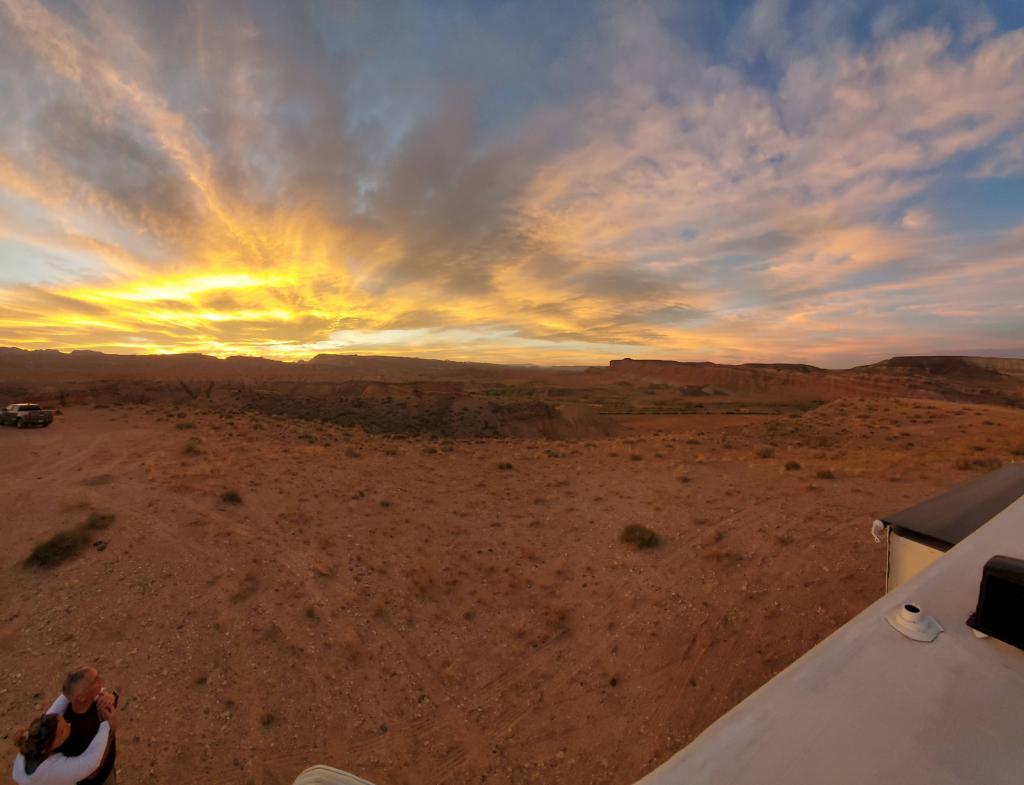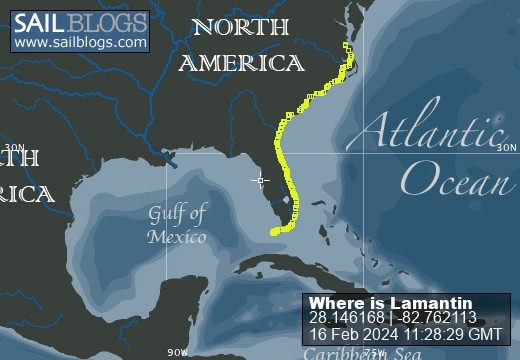
Alexi and Bob Sail Away
10 April 2022
24 February 2022
12 January 2022
20 October 2021 | Moving South
23 September 2021
02 August 2021
02 June 2021
19 May 2021
25 April 2021
08 April 2021
08 April 2021
15 February 2021
19 January 2021 | Marathon
02 January 2021
19 November 2020
17 November 2020
16 October 2020
31 August 2020 | Deltaville
13 July 2020
20 June 2020 | Portsmouth, VA
Cooking on a boat
11 February 2020
Robert Malkin
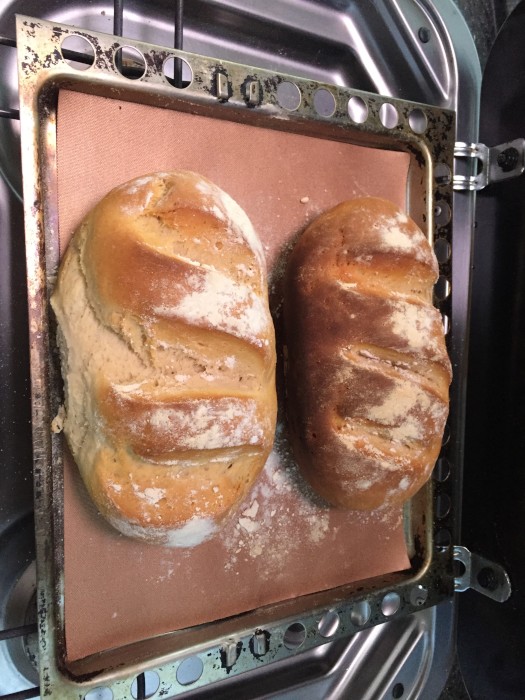
Until I quit my job, I was working 40-60 hours a week and writing 2-3 books a year. Needless to say, I rarely had time to cook or bake, two things I really enjoy. Now that I have the time, I’ve been experimenting with cooking aboard our boat.
It’s not all that different from cooking on land, with the exception of the oven, which doesn’t get quite as hot as its full-size relative. That means turning your bread over to cook the bottom. No biggie. It still comes out tasty! Boat Bread!
So what else is different?
1) Water. On a boat, you need to conserve water (our boat holds 120 gallons). This is especially true in the Bahamas, where most water is RO (reverse osmosis filtered sea-water). Water can run 50 cents a gallon, and although we have a watermaker, it only runs on the generator, which takes diesel. So boaters tend to use less water, especially when doing the dishes or showering.
I do a lot of one-pot meals for easier cleanup. And I’m having a blast since my daughter gave me a copy of a one-pot vegetarian cookbook.
2) Availability of food. Things I’ve been used to finding in my neighborhood grocery store can be hard to come by in the Bahamas, or the prices are outrageously high (usually twice what you’d pay in the US).
Instead of paying $10 for a container of yogurt, I made my own and, surprise, surprise, it was even better than store bought! I don’t have a yogurt maker, so I used a Thermos and it was super easy. Same goes for ricotta cheese. Who knew all you needed was to warm up milk and add vinegar? It’s delicious!
In making ricotta, I ended up with a lot of whey (the liquid that sits on the top of yogurt or a by-product of making cheese). First time I tossed it out. The second time, I found a recipe Vegetables pickled in whey left over from ricotta cheese-making for picking vegetables with whey. The jury’s out on that one (at least for 3 more days), but I’m told it makes delicious pickles.
3) Space. Space is at a premium in a boat galley, especially in the refrigerator, which is dormitory-sized. What I never realized was that in the US we tend to refrigerate many things that don’t need refrigeration. Ketchup, lemon and lime juice, hot sauces, mustard, steak sauce, veggies, fruit, and bread don’t need to be kept cold. Even eggs can be kept unrefrigerated for more than a month, so long as they were never refrigerated to begin with.
4) Time. I have SO much time to experiment, whether it’s figuring out how to use callaloo, a local leafy green that’s a cross between spinach and collards, or how to make my own sour cream.
Even with these limitations, I’ve gotten really good at substituting in recipes, and we’ve been eating really well. Healthier too.
It’s not all that different from cooking on land, with the exception of the oven, which doesn’t get quite as hot as its full-size relative. That means turning your bread over to cook the bottom. No biggie. It still comes out tasty! Boat Bread!
So what else is different?
1) Water. On a boat, you need to conserve water (our boat holds 120 gallons). This is especially true in the Bahamas, where most water is RO (reverse osmosis filtered sea-water). Water can run 50 cents a gallon, and although we have a watermaker, it only runs on the generator, which takes diesel. So boaters tend to use less water, especially when doing the dishes or showering.
I do a lot of one-pot meals for easier cleanup. And I’m having a blast since my daughter gave me a copy of a one-pot vegetarian cookbook.
2) Availability of food. Things I’ve been used to finding in my neighborhood grocery store can be hard to come by in the Bahamas, or the prices are outrageously high (usually twice what you’d pay in the US).
Instead of paying $10 for a container of yogurt, I made my own and, surprise, surprise, it was even better than store bought! I don’t have a yogurt maker, so I used a Thermos and it was super easy. Same goes for ricotta cheese. Who knew all you needed was to warm up milk and add vinegar? It’s delicious!
In making ricotta, I ended up with a lot of whey (the liquid that sits on the top of yogurt or a by-product of making cheese). First time I tossed it out. The second time, I found a recipe Vegetables pickled in whey left over from ricotta cheese-making for picking vegetables with whey. The jury’s out on that one (at least for 3 more days), but I’m told it makes delicious pickles.
3) Space. Space is at a premium in a boat galley, especially in the refrigerator, which is dormitory-sized. What I never realized was that in the US we tend to refrigerate many things that don’t need refrigeration. Ketchup, lemon and lime juice, hot sauces, mustard, steak sauce, veggies, fruit, and bread don’t need to be kept cold. Even eggs can be kept unrefrigerated for more than a month, so long as they were never refrigerated to begin with.
4) Time. I have SO much time to experiment, whether it’s figuring out how to use callaloo, a local leafy green that’s a cross between spinach and collards, or how to make my own sour cream.
Even with these limitations, I’ve gotten really good at substituting in recipes, and we’ve been eating really well. Healthier too.
Comments
| Vessel Name: | Lamantin |
| Vessel Make/Model: | Silverton 372 |
| Hailing Port: | Wilmington, NC |
| Crew: | Alexi and Bob |
| About: | We are taking a few years to live aboard our boat and visit some amazing places. |
| Extra: | Let us know if you want to come visit! |
Lamantin's Photos - Main
 |
Sights of us moving from the upper Chesapeake to FL in the fall of 2021
4 Photos
Created 20 October 2021
|
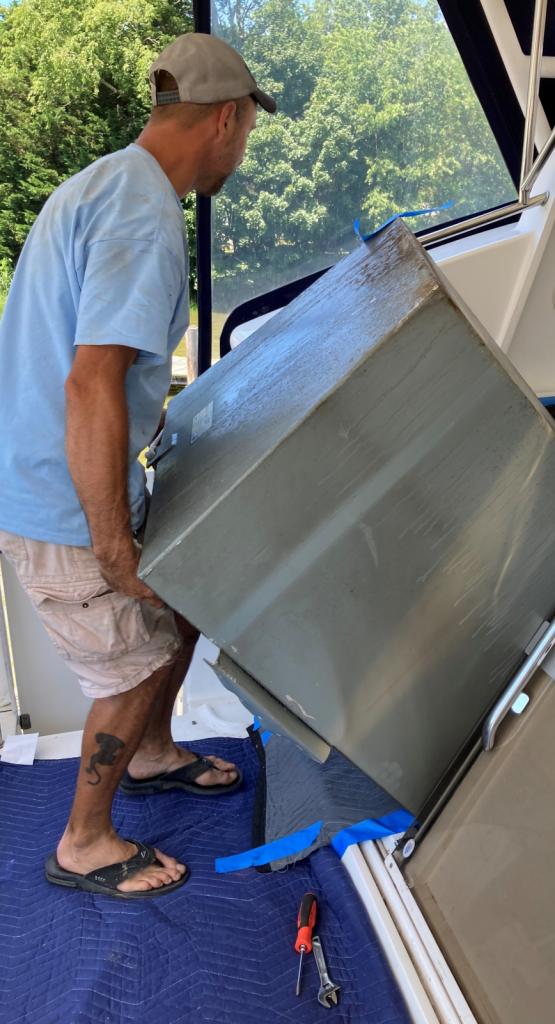 |
It is a huge job to replace the fuel tanks on a boat. Fortunately, they last about 20-25 years. So, we are not likely to ever do this again.
6 Photos
Created 2 August 2021
|
 |
Photos from our trip from Florida to Rhode Island in the spring of 2021
2 Photos
Created 19 May 2021
|
 |
We had two great weeks of friends and family visiting us on the boat on Great Exuma Island
18 Photos
Created 8 March 2020
|
|
The Exumas is a long chain of islands with many remote and beautiful spots to drop an anchor
39 Photos
Created 19 January 2020
|
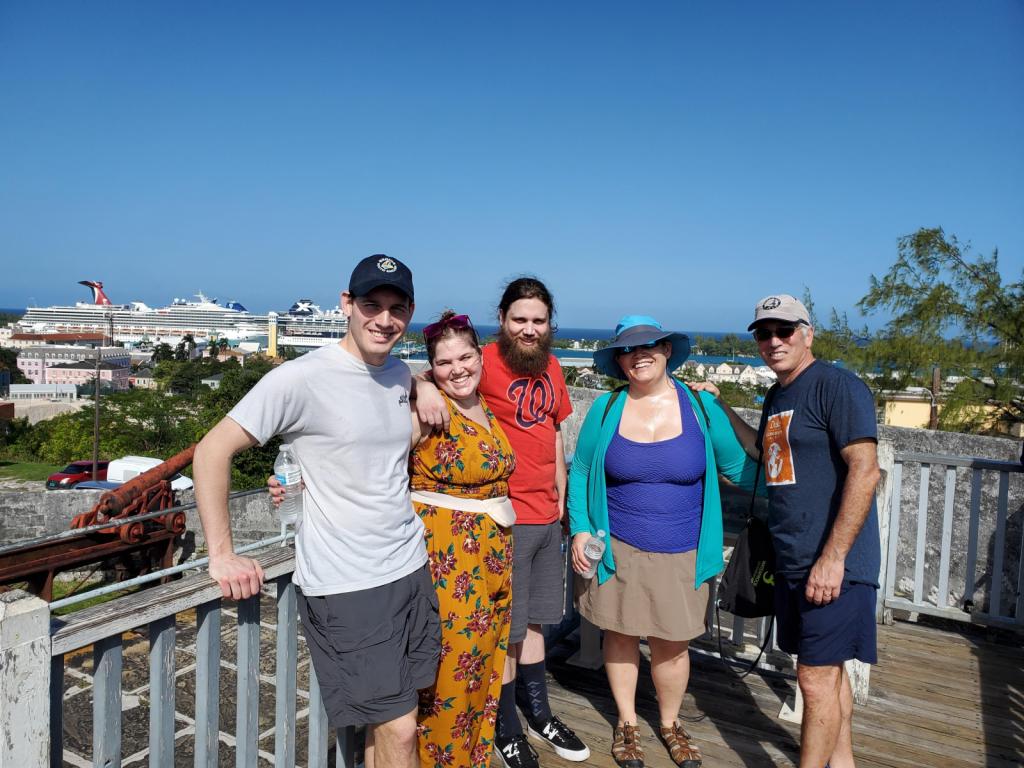 |
We had a great New Year's vacation with our children and friends in the Bahamas
27 Photos
Created 10 January 2020
|
Alexi and Bob Sail Away
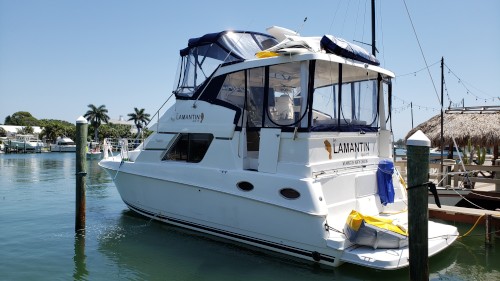
Who: Alexi and Bob
Port: Wilmington, NC




